
Friday, January 17, 2020
Faculty and graduate students from all five LUMS schools congregated at the Suleman Dawood School of Business to participate in a week long ‘No-Borders Teaching and Learning Workshop.’
The workshop was organized from January 13-17, 2020 and led by renowned international professors, Dr. J. B. Kassarjian (Professor of Management, Babson College, USA and Professor Emeritus, Strategy and Organization, IMD, Switzerland) and Dr. Joseph M. Pons (President, AXIOMA Marketing Consultants, Spain and Professor of Marketing at IESE Business School and IEDC-Bled School of Management). The unique interactive style of teaching made for a transformative experience for all those who attended.
The event was inaugurated by Rector LUMS, Mr. Shahid Hussain, and Vice Chancellor LUMS, Dr. Arshad Ahmad. Rector LUMS' underscored a University wide commitment to being at the forefront of learning and teaching. The Vice Chancellor encouraged faculty to continue availing the opportunities provided by the University in order to grow as educators, “We have to think about progress in terms of solutions and not just hope it will happen by sticking to the status quo. We have to disrupt ourselves; the true meaning of development and growing as individuals but also as a collective”, he said.
The workshop kicked off with remarks from Honorary Dean Suleman Dawood School of Business, Dr. Alnoor Bhimani. Dr. Bhimani stated, “Case-based teaching is not limited to the business school – it spreads across disciplines and is more powerful than just the transfer of knowledge.” Addressing the participants, he focused on the benefits of this methodology and added, “This will transform the way you think about teaching and will ultimately shape the lives of individuals you will encounter in the classroom.”
The workshop was split into two modules: Case-based Pedagogy, which was a two-day session, and No-Borders Integrative Teaching and Learning, which was a three-day session. Participants delved into the art of case-based learning, case writing, and course design as well as team teaching. The diversity of participants and group work created space for a range of different perspectives leading to productive and thought provoking conversations.
Bilal Jamil, a PhD Mathematics student talked about his experience saying, “I’ve learned a lot from the speakers as well as the participants. We had people from different levels of management; we had assistant professors, associate deans, people from a science background, business, and industry. All sorts of distinguishing barriers that were between us, were broken down.”
Discussing the purpose of the workshops, Professor Pons stated, “Our goal here is to improve the quality of education, to equip people with the self-confidence of knowing that certain methodological tools achieve objectives that are more ambitious and go beyond the simple transmission of information.” Professor Kassarjian added that the objective of the workshops was to encourage deep thinking about teaching methodologies and what works best in the classroom. He added, “Our main task is to provoke their thinking. That is very important to us. The way I measure the effectiveness of a programme is when we look at the feedback and they say this professor made me think in new ways. Then I think we have succeeded.”
In addition to the intricacies of teaching methodologies, Professors Kassarjian and Pons also discussed the wider issues surrounding teaching in the classroom, including the challenges of balancing a professional and personal life, and interacting with students. The weeklong sessions ended with a closing ceremony at the Vice Chancellor’s residence, where participants were awarded certificates. The Vice Chancellor thanked the instructors for their time and effort in travelling to Pakistan, and expressed his desire for future collaboration. Both Professors Kassarjian and Pons spoke highly about their experience at LUMS and the interactions they had with the participants.
Professor Kassarjian ended the ceremony with profound words of wisdom for all those present saying, “I’d simply like to say that the metaphor of a journey is an appropriate one. When you start on your journey, I hope you keep discovering and keep experimenting."












